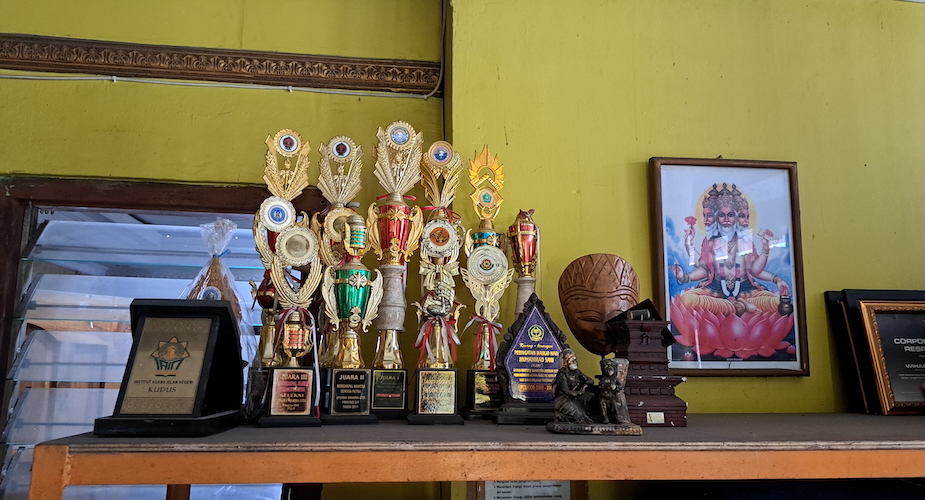Indonesia's crisis was caused by global 'market forces', transforming nation-states into commodities. MARK BEESON explains.
The major lesson to be drawn from the region's economic trauma lies not in the evils of crony capitalism, business-government collusion, or the need for greater 'transparency' in economic activities. It does not lie in the domestic Indonesian scene at all, but in the changing international economy. I am not attempting to defend the Indonesian government. Rather I want to unravel some of the factors that caused the crisis and that are likely to have profound and long-lasting implications for governments of all types.
Although the concept of 'globalisation' has become something of a cliche, it is a useful shorthand for an array of changes that seem to characterise the contemporary era. As far as nation-states are concerned, the most significant aspects of the process are political and economic.
Non-state actors like the International Monetary Fund (IMF) enjoy increased influence, and therefore necessarily reduce the autonomy of national governments. Meanwhile the organisation of economic activity has undergone great changes which constrain national policy options.
The activities of what are essentially political organisations like the IMF have enjoyed a high profile in the current crisis, especially in Indonesia. But it is the changing nature of economic activity which has been at the heart of the current crisis. In trying to make sense of these changes, it is helpful to distinguish between what might be called the 'real economy' and the 'financial sector'.
Real or financial?
The real economy is where goods and services are produced. It's the world of firms and direct investment in productive activities. In the contemporary era much of this directly productive activity and the investment that accompanies it occurs internationally: it is spread across national borders. This in itself has major implications for individual countries as they struggle to attract footloose investment capital by making themselves attractive to multinational corporations.
However, it is changes in the financial sector which are the most far-reaching, the most constraining of national autonomy and the most difficult to comprehend.
For all its problems, capitalism is a remarkably effective way of encouraging economic activity. True, this is not necessarily good news for the environment, the labour force or social equity, but it does mean that there has been an increasing amount of wealth creation.
As real economies have become more productive and larger, the financial sector has expanded as well, indeed much more so. It is this major structural change that is at the centre of the crisis.
Simply put, there has been a fantastic increase in the amount of capital circulating the globe which has no direct connection to 'real' economic activity. Daily turnover on the world's financial markets has reached US$1.5 trillion per day. To put this in perspective, Indonesia's annual GNP is only US$136 billion per year.
Mutual funds
Further fuelling this disparity between the size of national economies and the continuing growth of the global financial sector has been the emergence of massive mutual funds, particularly in the US. These are continuously on the lookout for profitable 'investment' opportunities, however transitory they may be.
The entire financial sector is becoming increasingly divorced from underlying real economic activity, be it domestic or international. From the point of view of fund managers, especially hedge funds of the sort made famous by George Soros, what matters is flexibility and liquidity.
Indeed, a good deal of what is described as 'investment' has nothing to do with long term plans to actually produce commodities for sale in markets. All that matters to financial players are opportunities created within markets themselves. Of critical importance in this regard are the activities of other market players. In other words, what matters is knowing which way markets are moving - no matter what is driving them.
This is important for two reasons. First, it explains why the situation in East Asia spun out of control so rapidly. The key here was a change in market sentiment, not in national economies. This in turn explains the second point: until very recently the East Asian model was almost universally praised as a possibly superior form of capitalism. In other words, when market sentiment was 'bullish', and the conventional wisdom had it that East Asia was seemingly a risk-free and lucrative investment, then cronyism, corruption and an absence of 'transparency' were apparently of little concern.
Contagion effect
So why has Indonesia been particularly hard hit? By the usual standards of economic orthodoxy, the so-called 'fundamentals', Indonesia looked healthy before the crash. Indeed, when measured by its foreign reserves, current account deficits, trade balance, and GDP growth, Indonesia was actually in better shape than Australia, which has remained comparatively unscathed.
Again it is important to remember that Indonesia was not the original epicentre of the crisis. Thailand was the initial trigger for the crisis and its high levels of short-term borrowing and an accompanying speculative property bubble meant that some sort of major shake-out was always possible.
What is most striking about the crisis in retrospect has been the so-called 'contagion effect' - the way one country after another has been sucked into the expanding economic, and latterly political vortex.
What has been driving the crisis to ever greater levels has not been the sudden discovery that some governments in East Asia are either corrupt, closely linked to or directly involved in economic activity, or that they are often indifferent to the rights of their citizenry. These circumstances have long been understood by those who wished to know. Such facts have merely provided a retrospective rationale for the shifting market sentiment that has been the major cause of the region's rapidly changing economic position.
Indonesia's changed status in the eyes of international investors is important for a number of reasons. Most obviously, the lack of support for the rupiah in international money markets has completely transformed the position of the Indonesian economy - to say nothing of the population at large! Apart from the immediate social distress, this changed status has far-reaching implications for Indonesia's - and East Asia's - relations with the rest of the world.
A key to understanding the way management of the crisis has unfolded is the link between political and economic interests in the wider international system. The general economic distress in East Asia represents a possibly unique opportunity for countries like the USA and influential trans-national institutions like the IMF to force the governments of East Asia to abandon policies of which they disapprove. In short, the crisis represents a chance to promote the sort of market-centred, neo-liberal policies that are the hallmark of countries like the USA, Britain and Australia.
More instability?
While oil prices were high, the Suharto government had no interest in market-oriented reforms, preferring to use windfall oil revenues to underpin its distinctive brand of patrimonialism. Yet while some observers might be inclined to celebrate the crisis' potential threat to authoritarian control, it is important to recognise that this will not necessarily solve any of Indonesia's economic problems.
If the IMF and the USA are successful in imposing neo-liberal reforms throughout the region this may well create the conditions for further economic instability. While it may suit the interests of those who hold mobile financial assets, liberalising markets and removing impediments to flows of capital in and out of small economies like Indonesia's is a recipe for further volatility.
True, access to external funds offers the possibility of accelerating economic development. But such dependence on external capital - especially short-term and footloose - also leaves countries highly vulnerable to rapid changes in market sentiment. Whatever the technical merits of pegging the rupiah at some fixed level to the US dollar, the Indonesian government will not be able to implement it in the long-term. Markets are simply too powerful for relatively small economies like Indonesia's to oppose. Such market power has implications for the sovereignty of all nations, not just Indonesia.
The major lessons to be drawn from the crisis are about the changing structure of the international economy. The principal source of the crisis has been the markets themselves, which continue to be driven by the most enduring 'fundamentals' of them all: fear and greed.
In Indonesia and East Asia more generally, panic replaced the reckless pursuit of profit as the essential dynamic determining sentiment toward the region, and it is quite possible that the contagion will spread. Even if this crisis were contained, it clearly demonstrates that any government, and more importantly, any 'real' economic activity, is now vulnerable to the predatory attentions of transnational market forces.
Market forces have effectively transformed nation-states into commodities, the attractiveness of which determines 'investment' levels. It is a new world order with implications for many more nations than just Indonesia.
Dr Mark Beeson is based at the Asia Research Centre, Murdoch University, Western Australia.











